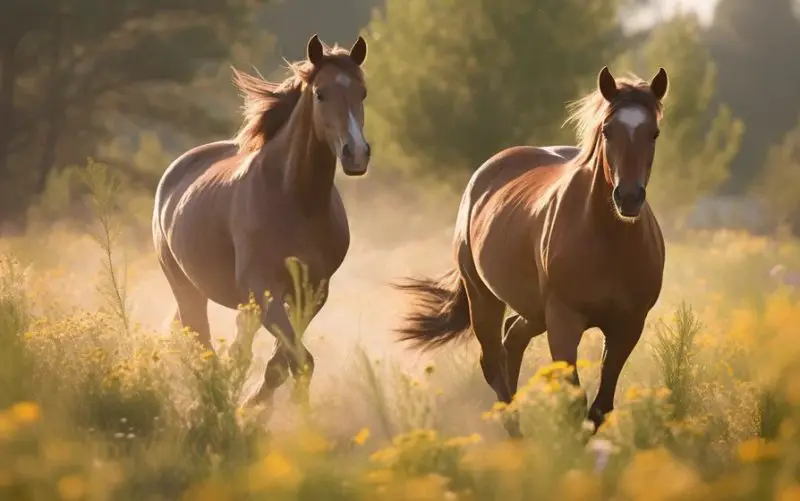Horses have been loyal companions to humans for centuries, serving as transportation, laborers, and beloved pets. If you’re considering owning a horse or are simply curious about these majestic animals, one of the most common questions is, “How long do horses live?”
In this comprehensive guide, we’ll explore the average lifespan of horses, factors affecting their longevity, and practical tips for extending their life through proper care.
Average Lifespan of Horses

The lifespan of a horse typically ranges between 25 to 30 years, although some horses can live beyond 40 years with optimal care. The age of a horse can vary depending on breed, genetics, environment, and healthcare practices.
Comparison by Horse Types:
- Domestic Horses: Most domestic horses live 25–30 years due to regular veterinary care and proper nutrition.
- Wild Horses: Wild horses often have a shorter lifespan of 15–20 years, primarily because of environmental challenges and lack of medical attention.
- Ponies: Ponies generally live longer than larger horses, with many reaching 35–40 years.
- Draft Horses: These larger breeds tend to have shorter lifespans, averaging 20–25 years due to their size and workload.
Record-Holding Horses:
The oldest recorded horse, Old Billy, lived an astounding 62 years in the 19th century. While this is rare, it highlights how exceptional care can lead to extended lifespans.
Factors Affecting a Horse’s Lifespan
Several factors influence the longevity of a horse, ranging from genetics to diet and exercise. Let’s explore these in detail:
Genetics
Heredity plays a crucial role in determining lifespan. Some breeds are genetically predisposed to longevity, while others may be prone to hereditary illnesses.
Diet and Nutrition
A balanced diet is vital for maintaining health and promoting longevity. Horses require:
- Forage: High-quality hay or pasture grass.
- Grains: Additional calories and nutrients for working horses.
- Vitamins and Minerals: Supplements to meet specific dietary needs.
- Water: Fresh, clean water is essential to avoid dehydration.
Exercise and Activity
Regular exercise strengthens muscles, improves circulation, and prevents obesity. Horses need structured routines based on their age, breed, and health condition.
Healthcare
Routine veterinary checkups, vaccinations, and dental care prevent diseases and ensure early detection of health issues.
- Vaccinations: Protect against diseases like tetanus and influenza.
- Deworming: Prevents internal parasites.
- Hoof Care: Proper trimming and shoeing reduce stress on joints.
Living Conditions
Clean, safe, and comfortable stables protect horses from injuries and harsh weather. Pastures should have adequate fencing and access to shade and shelter.
Stress Levels
Minimizing stress improves a horse’s overall well-being. Social interaction with other horses and regular routines prevent anxiety.
Signs of Aging in Horses
As horses age, they display noticeable physical and behavioral changes. Recognizing these signs early allows for better care and management:
- Dental Issues: Difficulty chewing or dropping food.
- Weight Loss: Decreased muscle tone and fat deposits.
- Gray Hair: Particularly around the eyes and muzzle.
- Joint Stiffness: Reduced mobility or arthritis.
- Vision Problems: Cloudy eyes or reduced responsiveness.
- Slower Recovery: Prolonged healing after injuries.
How to Care for Senior Horses
- Special Diets: Soft feeds and senior formulas to ease digestion.
- Joint Supplements: Glucosamine and chondroitin for joint health.
- Frequent Checkups: Regular vet visits to monitor organ function and overall health.
Tips to Prolong Your Horse’s Lifespan
Provide Balanced Nutrition
Offer high-quality hay, grains, and supplements tailored to your horse’s age, activity level, and health needs.
Maintain Proper Dental Care
Horses’ teeth grow continuously, making dental checkups essential to avoid problems like overgrown teeth or infections.
Ensure Regular Exercise
Daily exercise helps maintain weight, muscle tone, and cardiovascular health.
Create a Safe Environment
Keep stables clean, dry, and free of hazards. Fencing should be sturdy to prevent injuries.
Schedule Routine Vet Visits
Annual vaccinations, deworming, and physical exams ensure your horse remains healthy and disease-free.
Monitor Weight and Condition
Obesity or malnourishment can shorten a horse’s life. Adjust diets as needed and consult a vet for guidance.
Provide Mental Stimulation
Interactive toys, social interaction, and varied routines prevent boredom and stress.
Common Health Issues in Horses
Horses are prone to specific health problems that can impact their lifespan if untreated. Some common issues include:
Colic
A digestive disorder causing severe abdominal pain. Prevention includes proper feeding schedules and access to clean water.
Laminitis
An inflammation of the hoof causing lameness. Managing diet and maintaining proper hoof care can prevent this condition.
Arthritis
A common issue in aging horses. Supplements and anti-inflammatory treatments can ease discomfort.
Respiratory Issues
Dusty bedding and poor ventilation can lead to respiratory diseases. Keeping stalls clean and well-ventilated reduces risk.
Frequently Asked Questions
Q: Can horses live longer than 30 years?
Yes, with proper care, some horses live into their 40s, and rare cases exceed 50 years.
Q: What is the best diet for older horses?
Senior horses benefit from softer, high-fiber feeds and supplements to support digestion and joint health.
Q: Do different breeds have different lifespans?
Yes, smaller breeds like ponies tend to live longer than larger breeds like draft horses.
Q: How can I tell if my horse is aging?
Look for gray hair, weight loss, dental issues, and joint stiffness as signs of aging.
Q: What activities are safe for older horses?
Light riding, walking, and stretching exercises help keep senior horses active without overexertion.
Conclusion
Horses are magnificent animals that, with the right care, can live long and fulfilling lives. While the average lifespan of a horse is around 25–30 years, proper nutrition, exercise, healthcare, and a safe environment can significantly enhance their longevity. Whether you own a horse or plan to, understanding their needs and providing consistent care ensures they remain healthy and happy for years to come.
By following the tips outlined in this guide, you can create the best possible conditions for your horse to thrive well into its senior years. Remember, every horse is unique, and attentive care makes all the difference in their quality of life!






